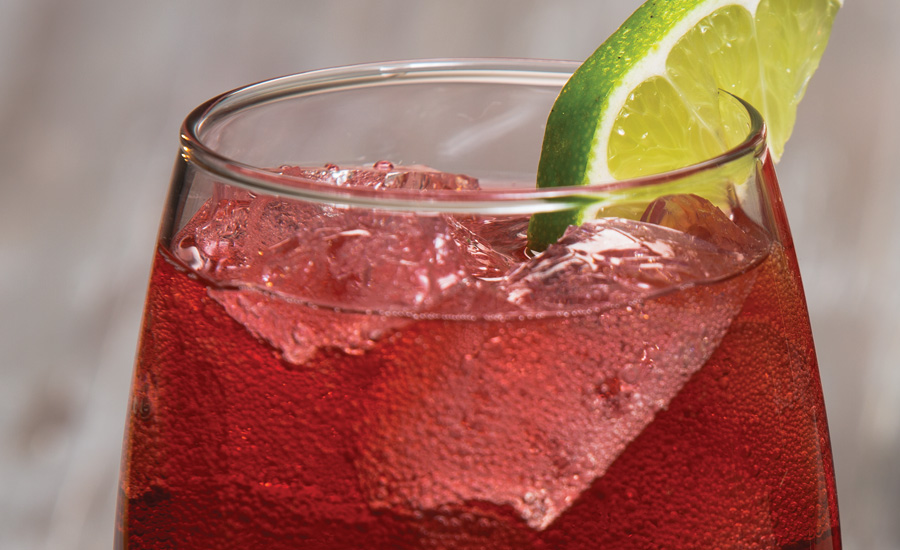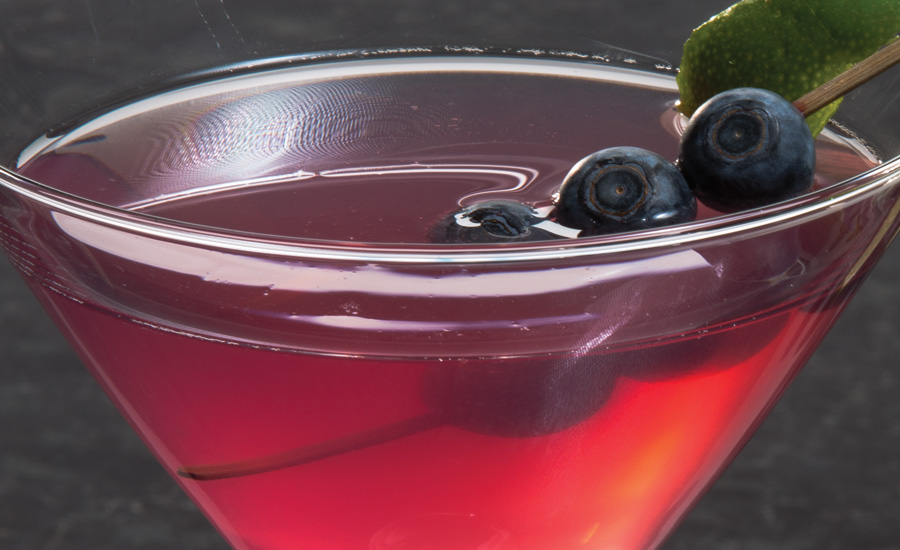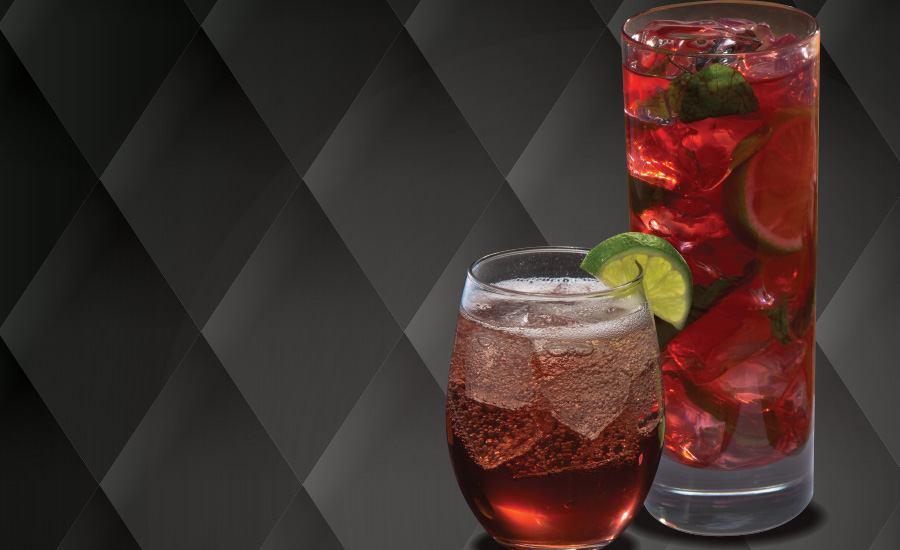The Coca-Cola Co. helps foodservice develop specialty drinks
Specialty beverages to account for about 30 percent of beverage growth between 2014-2017


The saying goes that variety is the spice of life. When it comes to foodservice menus, no truer words can be said. Whether it's better-for-you or indulgent trends, beverage menus are being retooled to accommodate drinks that fit these molds, and The Coca-Cola Co., Atlanta, wants to make sure it is working with its foodservice partners to develop all kinds of specialty beverage solutions.
"Research shows that consumers want new beverages, and specialty beverages are expected to account for about 30 percent of beverage growth between 2014 and 2017," says Clare Pitt, senior manager of full-service restaurant channel planning and development and national foodservice for The Coca-Cola Co. "In fact, non-alcoholic, specialty beverages are expected to grow by 16 percent in that time period, outpacing all foodservice non-alcoholic beverage growth."
Pitt adds that a desire to experiment is what's driving consumers to seek out these new offerings. "Sixty-eight percent of adults have said they like the experience of trying new beverages and 41 percent like to try them at restaurants," she says. "Research has shown that restaurants with rotating flavors or beverage options often see repeat visitors who want to try the other options next time."
Among the consumers fueling specialty beverage trends are millennials. "Millennials are a great audience for specialty beverages, as 40 percent of the demographic will order something different every time they visit a restaurant, and millennials account for 21 percent of total U.S. spending," Pitt notes.
Crafty concoctions
Similar to the packaged goods market, choice is what's driving the growth of specialty beverages within foodservice.
"The 2016 beverage landscape will continue to be about choice and pushing the envelope on flavors and flavor profiles," Pitt explains. "Specialty beverages play a big role here. According to Mintel research, specialty beverage sales in foodservice were $15.5 billion in 2014 and are projected to grow to $18.3 billion by 2017."
Within foodservice, flavor trends run the gamut whether it is savory, sweet or even bitter. "Some trends we've seen recently include sweet-and-spicy teas, house-made or handmade beverages, savory flavors, botanicals (including floral garnishes and herbal flavors), sour and bitter flavors, and a return to the classics," Pitt says. "Specifically within water, we've seen unique flavors like dragon fruit, acai and blueberry-pomegranate start to pop up. Within juice, common flavors like orange and apple still dominate, but unconventional flavors like coconut and coconut-pineapple are on the rise."
However, flavors trends are not always reserved to a specific category. In general, the branding of a drink as "signature" to a specific location or chain can help to intrigue consumers.
"We've seen an increase in the importance of signature drinks," she explains. "In fact, the word ‘signature' as a beverage menu item claim has risen 211 percent in the past year. In foodservice, the first step to a competitive menu is to offer distinctive food, and from that, a one-of-a-kind drink to create the perfect pairing.
"The tenets of mixology are no longer limited to alcohol," Pitt continues. "Non-alcoholic signature beverages are showing up on more and more menus. These include anything from handcrafted teas to fresh lemonade or classic carbonated beverages that can be further varied by offering a diverse array of flavors."
Health-and-wellness trends also are driving the success of signature drinks, Pitt notes.
"As the better-for-you beverage trend continues to flourish, the foodservice channel will see an increase in products with reduced calories that deliver functionality, like protein, fiber, vitamins, minerals, nutrients and energy," Pitt says. "Restaurants that provide better-for-you options often experience increased traffic, greater loyalty and higher profits, since these consumers often hold a ‘veto vote' in their dining parties."
Among the product attributes that have seen the most growth in past three years are dairy free, zero calories, gluten free, handcrafted, fresh and original options, Pitt says.
Consumers also are actively seeking out establish-ments that allow them to customize their own beverages. Tech-forward fountain machines as well as build-your-own concoctions like juices and smoothies are catching fire, Pitt notes. "Add-ins and mix-ins create even more opportunities for consumers to make drinks their own," she adds.
Dining times are another trend impacting the signature drinks market. "According to Packaged Facts, two-thirds of adults agree that they are eating between traditional meal times," Pitt says. "A 2014 Technomic report revealed late-night dining out is growing, with 31 percent of consumers visiting foodservice late at night at least once a month."
Because of these non-traditional eating times, foodservice operators should have a beverage menu that caters to the various times of the day as well as the needs, schedules and lifestyles of those consumers, according to Pitt.
"Our lives today are so hectic that people are seeking simplicity, and we are returning to simpler creations when it comes to beverages," she says. "The trend used to be the more complex the better — the more flavors, layers and ingredients — but now people are moving in the other direction, and we need to offer options to meet that preference as well."
Too good to not share
Although family recipes typically are only shared with a select few, The Coca-Cola Co. does not follow that motto when it comes to unique beverages for foodservice. It even has a dedicated team to craft drinks that work for their various channels/partners.
"The Coca-Cola Co. has teams within our organization that work to develop tools and resources that will benefit our partners and create solutions that their consumers are looking for," Pitt says. "As new insights are uncovered through our research, we work hard to ensure that our partners are armed with the latest information that will help grow their businesses."
To ensure those insights are spot-on, the company turns to market research firms as well as other industry experts.
"We regularly work with leading research partners like Food IQ, Mintel and some of the top chefs within the industry to analyze trends and changes in consumer taste preferences as well as create unique and ownable recipes," Pitt says. "We gather these insights not only to inform our own business but to share with our foodservice partners, helping them grow and improve their businesses as well. It's part of our commitment to be our customers' best partner, providing them with relevant research, resources and tools to help increase sales and achieve growth."
Among the ways The Coca-Cola Co. communicates its specialty recipes to foodservice operators is through its website, CokeSolutions.com, which has Recipe Box, an online resource with beverage concoctions for 73 of its brands, Pitt explains.
"Just using Coca-Cola, a diverse range of options can be created," she notes. "Some of our own concoctions include Coca-Cola Acai, Coca-Cola Bombay and Coca-Cola Chocolate."
She adds that vitaminwater is another key resource for specialty drinks because of the functional and nutritional benefits its portfolio can offer. "For example, Skinny Peach Freeze uses vitaminwater zero with fresh peach and other ingredients to create a chilled, low-calorie drink," Pitt says. "Other innovations made from some of our other brands include Pink Lemon Iced Tea, which combines our Gold Peak Green Tea, Minute Maid Lemonade and vitaminwater zero, and My Amour, which features Coca-Cola Cherry, Sprite and vitaminwater."
With such a vast portfolio, The Coca-Cola Co. concocts recipes that hit on better-for-you beverage trends, indulgent offerings or even a combination of the two, Pitt notes.
"The beauty of Coca-Cola is that there really is an option for everyone," Pitt says. "We are always looking at consumer trends and flavor profiles so that we can introduce new products or new variations of classic products to meet the needs of the changing consumer. Our vast portfolio of products can provide the base for any type of specialty beverage solution a consumer needs."
But specialty drink recipes aren't the only way The Coca-Cola Co. is arming foodservice operators with the tools they need to succeed.
"We also list the foods that would go best with that particular beverage, as food and beverage pairings are becoming increasingly important in foodservice," she says. "In addition, we have strong partnerships with some of the top chefs in the industry that can help operators create additional recipes based on their needs and objectives."
The company also can help foodservice operators promote specialty beverages and food and beverage pairings with marketing materials designed to resonate with consumers. "Coca-Cola wants each specialty beverage program to be as much of a success as their partners do; therefore, we have multiple tools, beautiful imagery and marketing collateral that can be accessed to help build and promote their programs," Pitt says. "If what we have doesn't quite fit our partners' needs, we are always there to walk through additional options and solutions."
The know-how
Although The Coca-Cola Co. has developed a strong portfolio of specialty drink options from which foodservice operators can choose, a strong beverage menu stems from knowing your audience.
"It's important to understand the consumer's motivators before developing a specialty beverage program by considering and answering three simple questions: why, when and where," Pitt says.
"It all begins with the why (i.e. the consumer's need state). Do they have time to spare? Are they with friends, or are they celebrating? These are all examples of why a consumer may choose to consume a specialty beverage."
Harking back to the growth of non-traditional meal times, Pitt adds that understanding when different beverages are purchased can help a foodservice operator pinpoint the right beverage for each occasion.
"Whether it's a functional beverage enriched with protein and nutrients acting as a meal replacement or an ice-cold accompaniment to their on-the-go meal, understanding when they're consuming will help define the appropriate specialty beverage recipes," she says.
With a full grasp on the why and the when of consumer drinking trends, operators then approach the where, i.e. the places they are buying beverages to help customize a beverage menu based on the channel, Pitt explains.
"The outlet may be chosen out of habit, convenience or price point, but the location and environment can also dictate their decision, as well as their expectation of the complexity of the beverage," she says.
After identifying the why, when and where, now is the time to lay out goals and a game plan for execution. "Once the consumer's mindset is clearly defined, it's important for each operator to identify elements that will make their specialty beverage program obtainable through execution and set it apart within the market," Pitt says. "Leveraging iconic, key brands provides credibility to consumers, and utilizing the latest flavor trends will spark consumer interest and desire. Limited-time offer programs can drive a sense of urgency and work exceptionally well within a seasonal approach that can highlight the freshest ingredients."
In addition to the urgency of seasonal releases, these specialty beverages also can lend themselves to increased visits.
"Seasonal and holiday-themed beverages are important because they create a sense of ‘get it while it's here' immediacy," Pitt says. "Offering these on a rotating basis also builds repeat visits, and these variations appeal to consumers' need for something new and unique."
Limited-time offers (LTOs) not only can benefit foodservice operators but also consumers, Pitt notes.
"For operators, LTOs provide a low-risk way to test new flavors and concepts," she says. "Since we know consumers like trying new beverages, LTOs provide that chance to explore and experiment. They are also a great way to market specialty beverages because they appeal to consumers' sense of flavor adventure and thirst for newness, while keeping more traditional people happy by not removing or even flavor-enhancing classic menu offerings."
Even with all the research and resources that The Coca-Cola Co. has obtained, executing a successful specialty beverage menu does not need to be viewed as a complex undertaking.
"It's important to note that recipes do not always have to be complex to be successful," Pitt says. "Leveraging existing products and equipment will help build the base for a well-executed program. From there, consider adding one or two ingredients — like fresh, seasonal fruit or syrups — to create a new, must-have option that won't drive significant costs.
"Investing in a crew program is an important consideration when promoting a new specialty beverage," she continues. "Properly educating and training your crew builds the foundation for a consistent product. Incentivizing should also be considered to encourage and excite your crew to promote the program directly to consumers."
Another key element is consistent execution of these creations. "Consumers expect consistency when ordering their product, and creating an exciting crew program will help drive the importance behind the investment of your program," she says.
As consumer taste preferences evolve, so, too, will beverage menus. Yet, with research and the right partners, foodservice operators will be able to seamlessly move with the transition.
"Based on our research, we don't see the specialty beverage category slowing down any time soon," Pitt says. "Consumer dining occasions continue to diversify, which means their needs, appetites and expectations will continue to develop and expand. The Coca-Cola Co. will continue to focus on understanding the latest flavor trends and consumer insights to develop beverage solutions that will meet the needs of the ever-changing consumer."
Rinser-Filler-Capper 3in1 for CSD(DCGF18-18-6): http://www.sunstarmachine.com/html_products/Rinser-Filler-Capper-3in1-for-CSD(DCGF18-18-6)-400.html
Carboanted Drink Filling Machine Monoblock DCGF16-12-6: http://www.sunstarmachine.com/html_products/Carboanted-Drink-Filling-Machine-Monoblock-DCGF16-12-6-399.html
Glass Bottled Carbonated Drink Machine: http://www.sunstarmachine.com/html_products/Glass-Bottled-Carbonated-Drink-Machine-412.html









